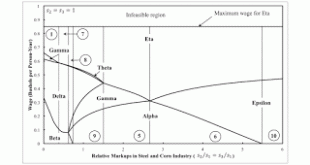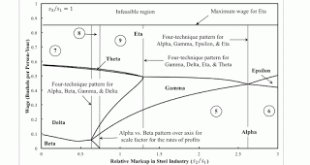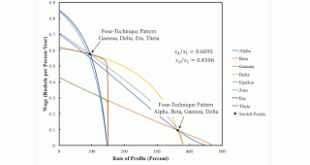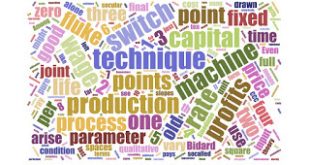1.0 Introduction I have previously considered some points on which Marx is vulnerable. In this post, I mention three mistakes. I take the first from Joan Robinson and probably the second point too. I take the third from Ajit Sinha. The second is perhaps the least original. You can find lots of stupid stuff and nonsense about Marx. Pointing out these particular mistakes is beyond many. To have an opinion about these points, one must read Marx. One might even accept that Marx is mistaken...
Read More »Perturbations Of Markups In Iron Industry In An Example With Produced Iron, Steel, And Corn
Figure 1: Switch Points Varying With Perturbations In Markup In Iron Industry I have created an example with three produced commodities and a choice of technique. The three produced commodities are called iron, steel, and corn. Corn is taken to be the numeraire and the only commodity purchased by households for consumption. Markups are assumed to vary among industries, even when prices of production prevail. I was able to locate various fluke switch points in that example. The fluke switch...
Read More »Variation In Switch Points With Markups
Figure 1: Variation of Switch Points with the Markup in the Steel Industry1.0 Introduction I want to continue to analyze this example. This example does not do everything I would like with a three-commodity example. Specifically, I do not have a case of triple-switching in the parameter space I explore in this post. That space of relative markups, in a model with n industries, has (n - 1) dimensions. And it is partitioned by (n - 2)-dimensional manifolds, where each manifold corresponds to...
Read More »Adam Smith On The Source Of Profits And Rents In The Exploitation Of The Worker
"In that early and rude state of society which precedes both the accumulation of stock and the appropriation of land, the proportion between the quantities of labour necessary for acquiring different objects seems to be the only circumstance which can afford any rule for exchanging them for one another. If among a nation of hunters, for example, it usually costs twice the labour to kill a beaver which it does to kill a deer, one beaver should naturally exchange for or be worth two deer....
Read More »Richard Wolff Versus Steven (“Destiny”) Bonnell
[embedded content]A Debate on Socialism versus Capitalism I suppose Destiny entered this debate in good faith. But why did he have to lie about what Wolff was saying? Wolff certainly never repudiated the labor theory of value in his opening remarks. And later Wolff explicitly argued that the Democrats are not socialist. One may not understand or agree with Wolff, but why lie? Apparently "Destiny" feels he lost badly and has been trying to find somebody less eminent to contrast his...
Read More »Brad DeLong, Noah Smith, And Others On The Cambridge Capital Controversy
Brad DeLong and Noah Smith chat about the Cambridge Capital Controversy on their podcast, Hexapodia is the key insight. Noah says it was only mentioned in one of his classes on macroeconomics, but seems to say he was never formally taught it. Given his summary near the start of this discussion, he has obviously read something about it. Brad thinks the language used by the MIT economists in the 1960s was badly and inaccurately phrased and poorly suited to shed light. He says he had trouble...
Read More »Paul Krugman Ignorant Of The Cambridge Capital Controversy
Zach Carter has an appreciation of Joan Robinson's work on imperfect competition, with a bit about the role of Cambridge circus in helping Keynes write the General Theory. Paul Krugman, gatekeeper, reacts: "Nice appreciaton of Joan Robinson, although no mention of her later role. Sad to say, as a student I mainly encountered her through the 'Cambridge capital controversy', a huge intellectual muddle. Somehow Robinson and others managed to convince themselves that the moral legitimancy of...
Read More »Two Four-Technique Patterns With Markup Pricing
Figure 1: Wage Curves for the Example1.0 Introduction The Cambridge Capital Controversy (CCC) applies to models both of competitive industries and of non-competitive industries. Around a switch point exhibiting capital-reversing, a higher wage is associated with greater employment per unit of net output produced. It is not merely a question of what technology is available. It is also a matter of the power of firms among industries to extract value from their workers, their upstream...
Read More »Fluke Switch Points in Pure Fixed Capital Systems
I have a working paper at the Centro Sraffa. Abstract: This article considers structural economic dynamics, in models with fixed capital and a choice of technique, of the production of commodities. Fluke switch points are described and cataloged. For fluke switch points, parameter perturbations create a qualitative change in how the choice of technique varies with distribution. Techniques are presented for visualizing partitions of parameter spaces such that the analysis of the choice of...
Read More »Algebraic Geometry
[embedded content]An Introduction to Algebraic Geometry I have been looking for fluke switch points in certain parameter spaces of coefficients for polynomial equations. Bertram Schefold has pointed out to me that I may want to look into algebraic geometry. This may be beyond me. I consider what I have been doing as exploratory mathematics, and I have been relying on numerical algorithms. I started with thinking that there is a parallel to bifurcation theory. But Barkley Rosser convinced me...
Read More » Robert Vienneau: Thoughts Economics
Robert Vienneau: Thoughts Economics




